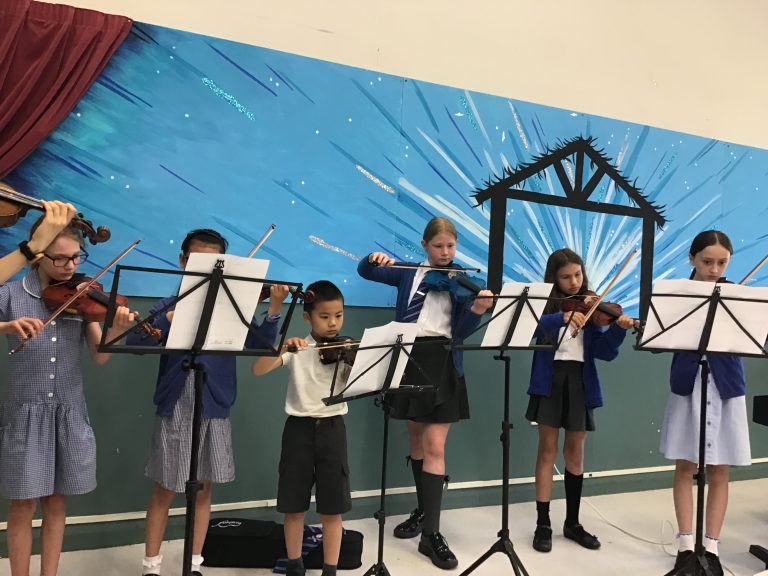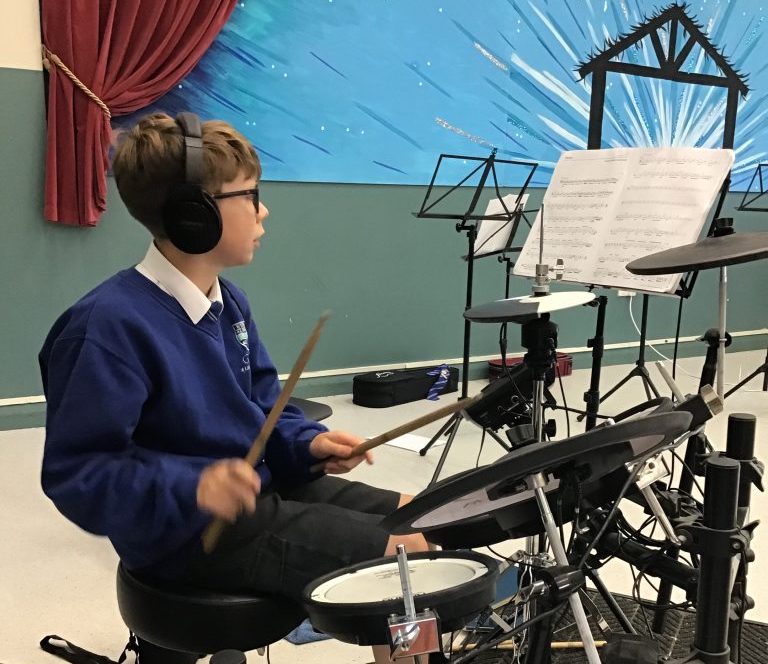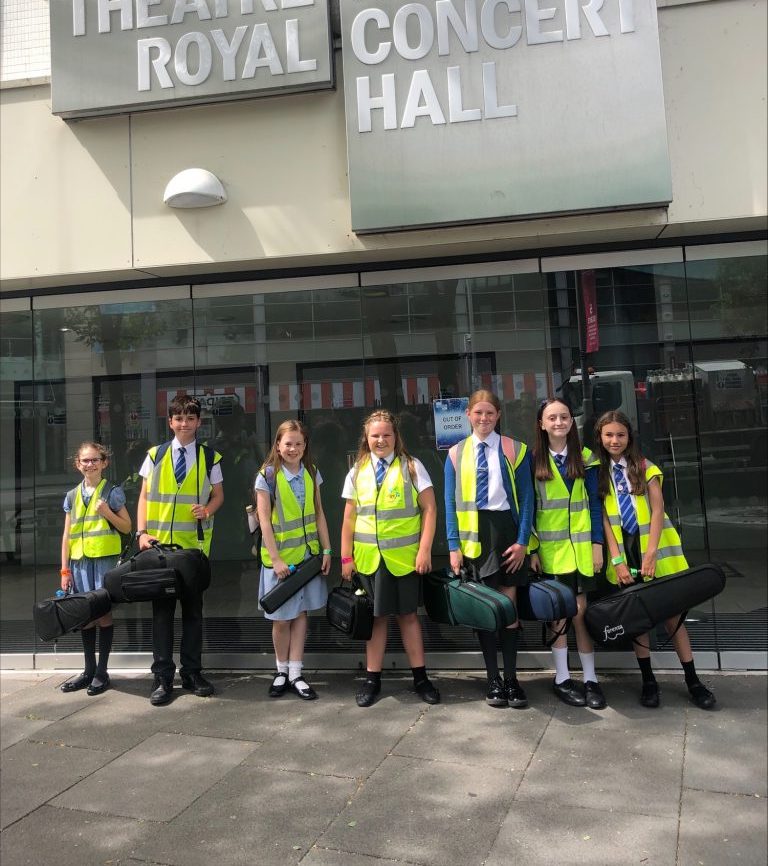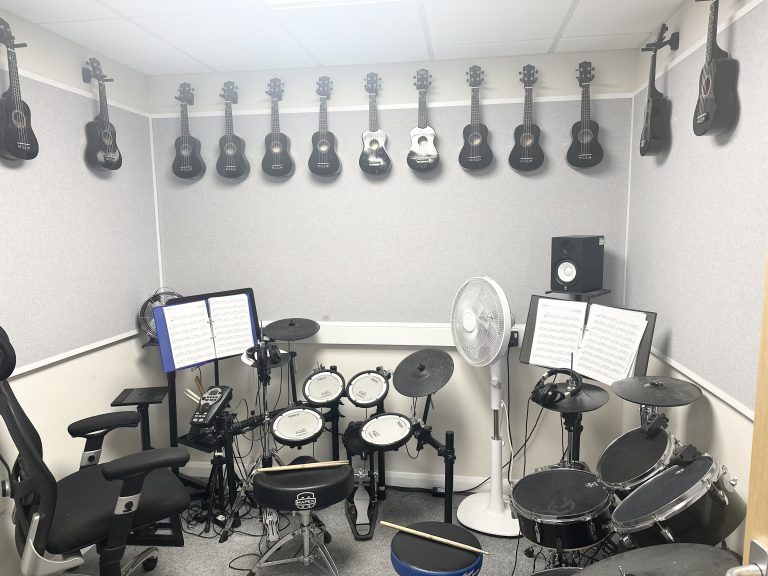
Learning music at Witham St Hughs Academy is an exciting and inspiring journey into a world of musical exploration and discovery. Pupils should leave our Academy with a passion to continue to engage with, perform in and create their own music as they mature into adulthood.
This will be for the enjoyment of themselves and others via their own musical creations and performances. During a pupil’s time as a Witham musician, they will have a wide variety of experience of performances, along with the chance to listen to performances that inspire them. They will have opportunities to play a variety of musical instruments from djembes, ukuleles, trumpets and more. Furthermore, they will develop a keen listening ear from a broad exposure to a variety of musical genres from around the world. Their musical understanding will support them as they progress into the next part of their journey into KS3.

We believe that a high-quality music education should inspire an environment of exploration, creativity and flair for music – creating inquisitive musicians who want to know how music is created and performed. We believe music teaching should equip all pupils with the knowledge and experiences which will inspire them, and give them the opportunities to access music at their own level. Our curriculum is rooted in both the National Curriculum requirements for music as well as information published and recommended by the Department of Education within the Model Music Curriculum.
Disciplinary and Substantive Knowledge
We believe that pupils need four key elements of essential knowledge to excel in music which can be broadly categorised into: musicianship, composing, singing and listening. Our curriculum is designed to teach each of these areas in every year group with knowledge and skills which are built upon progressively and in a sequential manner.
Alongside this substantive knowledge, children also need the disciplinary knowledge to understand how musicians read, play, perform and most importantly enjoy music. As they progress through the Academy, these skills develop, to allow children to form their own ideas, opinions and creativity as musicians. In order to develop pupils’ substantive knowledge, teachers adopt subject specific pedagogy when teaching music, ensure they are teaching like a musician so that pupils can learn like musicians. To support these aspirations, specialist music teachers support children in their learning in Years 3, 4 and 5.
Our music curriculum is taught in an exciting and engaging way so as to inspire a passion and desire to see, hear and take part in musical experiences throughout life. Children have many opportunities to take part in first hand musical experiences to bring our curriculum to life.
Throughout their musical journey at Witham St Hughs Academy, children will have the opportunity to play djembes, ukuleles, recorders, glockenspiels, un-tuned percussion and samba. We also offer a wide variety of peripatetic lessons for strings, woodwind, brass and percussion instruments. Uptake of these opportunities are very high, with over 50% of our KS2 pupils learning an instrument in 1:1 or 2:1 peripatetic lessons.
Witham St Hughs Academy has high aspirations for all learners within music, and skilled teacher adaptation allows all learners to access the curriculum and stretch and challenge the most able.
Areas of learning are designed to carefully build knowledge and understanding over time, for example Year 2 children will show their learning through graphic and dot notation, where in Year 3 children begin to learn and use musical notation on a musical staff. They will build in confidence in reading musical notation, and by Year 6, pupils deepen their learning and understanding through their use of notation in their own compositions. Teachers regularly recap previous learning to ensure that learning is sustained and built upon, and allow for misconceptions to be addressed and corrected. The use of accurate and ambitious music technology is also expected through our curriculum, where children can also build their composition skills via editing apps and editing software.

Musical experiences are a-plenty and build in both exposure and complexity across pupils’ time as a musician at our Academy. In the Foundation Stage, for example, pupils will focus on exploration of music through play, in a safe and familiar environment while also looking at familiar rhymes and songs that they can enjoy listening to and taking part in. As children progress in to Key Stage 1, they will broaden their musical skills by learning to play the djembe drums in whole class music lessons, and pupils also begin to take part in weekly singing assemblies.
As pupils move into LKS2 their musical exposure broadens as a specialist music teacher facilitates their learning. At this point, children begin to develop the skills of reading and writing musical notation on a musical staff. In UKS2, pupils build on all of their prior learning, and have an expert from the local music hub to support their learning to play the trumpets and trombones in whole class music lessons. These experiences and skills go on to inform their own use of music and notation in pupils’ own compositions in Year 6.
Outside of the classroom, children in the school choir meet weekly and regularly perform in assembly or take part in other wider community events, such as carol concerts and even trips to the local theatre to sing alongside other schools. Pupils aspire to be part of our choir, which is currently over 50 pupils strong! Our more experienced musicians have had the opportunity to watch the Halle Orchestra perform at the Royal Concert Hall in Nottingham, and they also have the opportunity to play along with them at these events.

From the moment you walk in the door! You will see music on display in the corridor, showcasing some of the amazing activities and talents that take part throughout the year including whole class lessons, ensembles, choir and peripatetic lessons. Each year four productions take place across the Academy, from Foundation Stage to Year 6, where all children have the opportunity to perform in front of their peers, families and carers. In our school library two music pods are used daily to support the learning of children who engage in peripatetic lessons, and pupils can also use this space to spontaneously practice and enhance their own musical skills.
Listen out on a Wednesday afternoon, and you will hear the glorious choir rehearsing along with weekly singing assemblies in Key Stage 1 and 2 respectively, where all children are taught how to sing collaboratively. Our enhanced provision offers a variety of musical clubs for children to take part in outside of the school day from marching band to music technology.
National Plan for Music document available upon request.
